The school play that sent a mother to prison
- Published
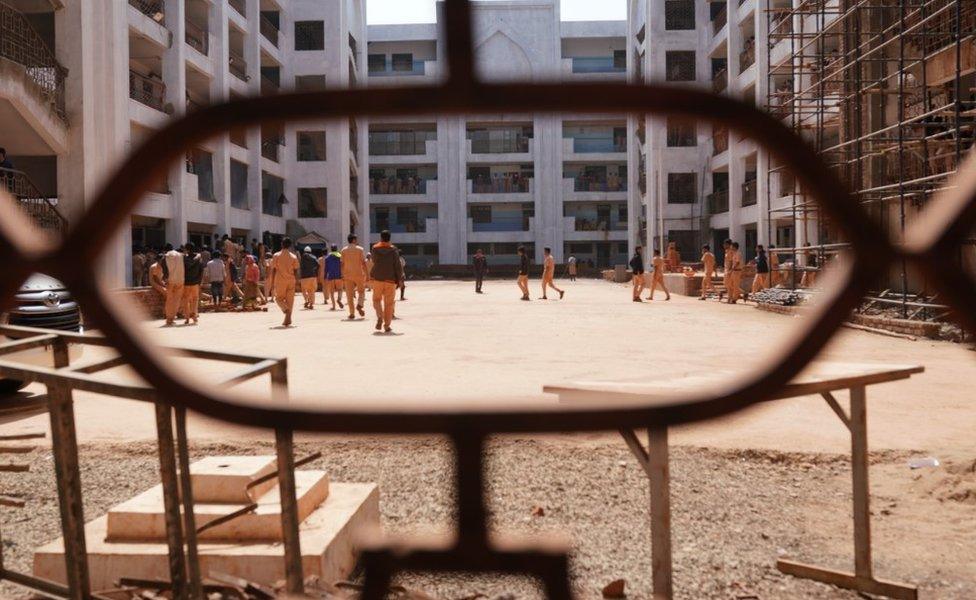
A play staged at Shaheen School has led to the arrest of a parent and a teacher
An Indian school play involving nine to 12-year-olds became the subject of national attention after it landed a young mother and a teacher in jail. BBC Telugu's Deepthi Bathini reports.
"I'm not sure how I ended up here," says 26-year-old Nazbunnisa, a single mother who did not give her last name and who works as a domestic help.
She was arrested on 30 January, along with Farida Begum, a teacher at her daughter's school. The charge against them: sedition, which the women, both Muslim, deny.
They spoke to the BBC in a prison official's office at Bidar district jail in the southern state of Karnataka. Both were on the verge of tears - they said they are trying to be "strong", but their lives have suddenly tuned "upside down".
Their bail hearing is scheduled for Tuesday. Their lawyer says the charge of sedition is being misused.
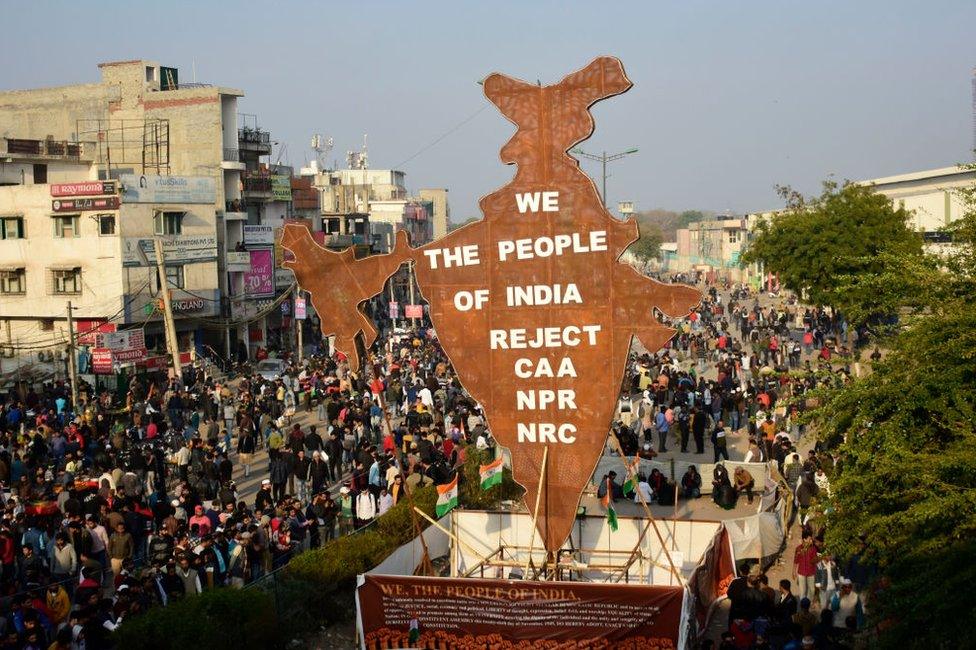
The citizenship law has sparked huge protests
It stems from a colonial-era law that was used to quash dissent, but is still deployed liberally despite the Supreme Court's attempt to limit it by making incitement to violence a necessary condition.
The two women are accused of spreading "false information" and of "spreading fear among [the] Muslim community" and of using children to insult India's Prime Minister, Narendra Modi.
Their ordeal began with a play put on by the students and staff at Shaheen School in Bidar, where Ms Nazbunnisa's daughter studies and Farida Begum, 52, teaches.
The play was about a controversial new citizenship law, which has polarised India since it was passed in December by the governing Hindu nationalist Bharatiya Janata Party (BJP).
The Citizenship Amendment Act (CAA), offers amnesty to non-Muslim immigrants from Pakistan, Bangladesh and Afghanistan. It sparked fear among India's 200 million-plus Muslims as it came in the wake of the government's plans to introduce a National Register of Citizens (or NRC) based on those who can prove their ancestors were Indian citizens.
Authorities are yet to clarify what documents would be needed to prove citizenship, but taken together, the measures have spurred massive protests - critics say the government is marginalising Muslims while offering a path to citizenship for people of other religious communities who fail to make it on to the NRC.
The governing BJP denies these charges, and insists India's Muslims have nothing to worry about.
So, given the contentious subject, after one of the parents streamed the school play live on Facebook, the recording quickly went viral. Local resident Neelesh Rakshal was among those who watched it.
Mr Rakshal, who describes himself as a social activist, says he became furious over a scene where a man approaches an elderly woman and tells her that Narendra Modi wants Muslims to produce documents proving their Indian citizenship and that of their ancestors, and if they fail to do so, they will be asked to leave the country.
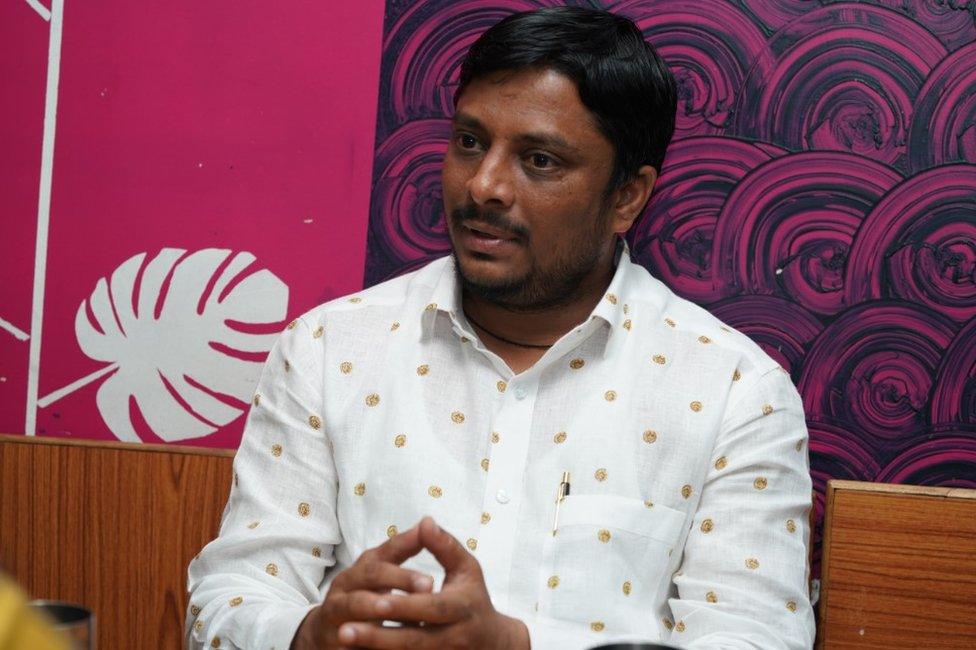
Mr Rakshal says the play "spreads hatred"
The woman responds that she has been in India for generations and would have to dig up the graves of her ancestors to look for documents. She then says a "boy who was selling tea", a reference to Mr Modi who has said he used to sell tea as a teenager, is now demanding that she show him her documents.
"I will ask him for his documents and if he doesn't show them to me, I will hit him with slippers," she adds.
Mr Rakshal says he immediately registered a police complaint against the school for "using children in a school play to abuse the prime minister and also for spreading hatred".
The complaint named the school management and the parent who streamed the play. While several members of the school management and the president of the school have also been charged with sedition, police told the court they are still looking for them.
"We do not know for what reason sedition charges have been invoked against the school. It is beyond the imagination of any reasonable person. We will fight it in court," the school's CEO, Thouseef Madikeri, says.
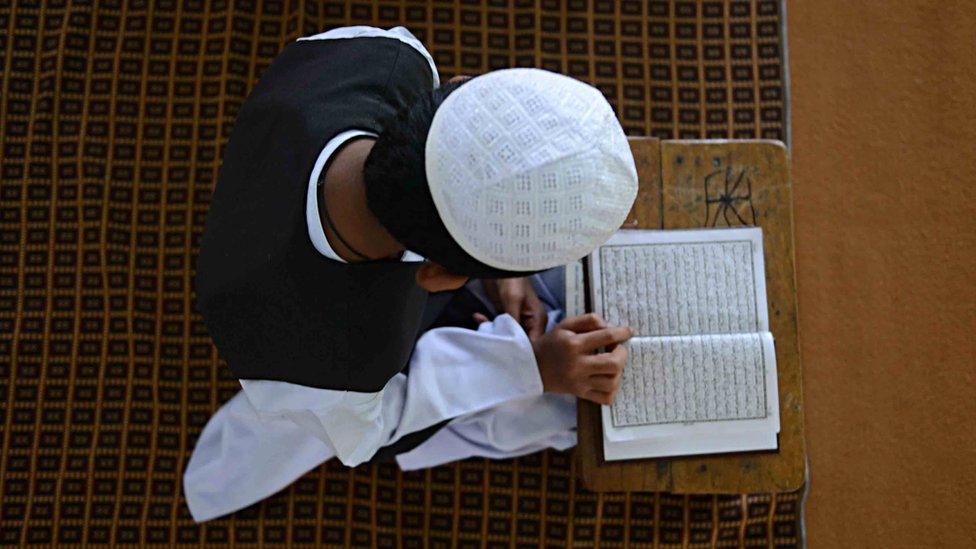
School officials allege that they are being targeted because most of the students are Muslim
Police also questioned students - videos and screen grabs of CCTV footage showing them speaking to students were shared widely on social media, prompting criticism.
Mr Madikeri alleges that on one occasion, police in uniform questioned students, with no child welfare officials present - an accusation denied by police superintendent DL Nagesh.
"The students were questioned five times. It's mental harassment to students and this may have an impact on them in [the] long run," Mr Madikeri says.
The Karnataka State Commission for Protection of Child Rights has asked police to explain why they questioned students so many times. Police say it was because not all the students were available at the same time.
Mr Madikeri told the BBC it was the questioning of students that led to the arrest of Farida Begum and Ms Nazbunnisa.
One parent whose child was questioned says she is now scared of going to school.
"My daughter told me police repeatedly asked her to identify the teachers and others who might have taught them the [play's] dialogues," he said.
"I do not understand what was wrong in the play. Children have been seeing what has been happening around the country. They picked up the dialogues from social media."
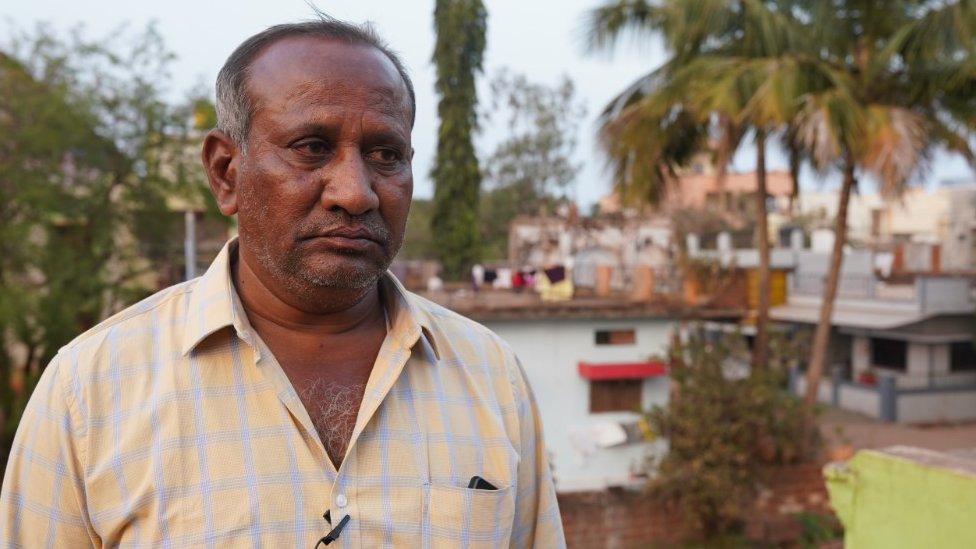
Farida Begum's husband is worried about what will happen
Ms Nazbunnisa is also perplexed as to why she was arrested.
"My daughter was rehearsing for the play at home," she says. "But I did not know what it was about, or what this controversy about CAA or NRC is about. I did not even go to see her play."
Ms Nazbunnisa has met her daughter only once since she was jailed: "It was just for a few minutes, and even then only through a window. I held back my tears. I did not want to scare her further."
The girl is staying with a friends of the family - they told the BBC she is having nightmares and often wakes up crying for her mother.
"She has been pleading that her mother not be punished for her mistake. She is sorry for what has happened," one of them says.
Farida Begum, who suffers from high blood pressure, says she is "scared of what the future holds". Her husband, Mirza Baig, says he fears that his wife being in jail will affect his daughter's marriage prospects.
"Whatever is happening is not right," he says.